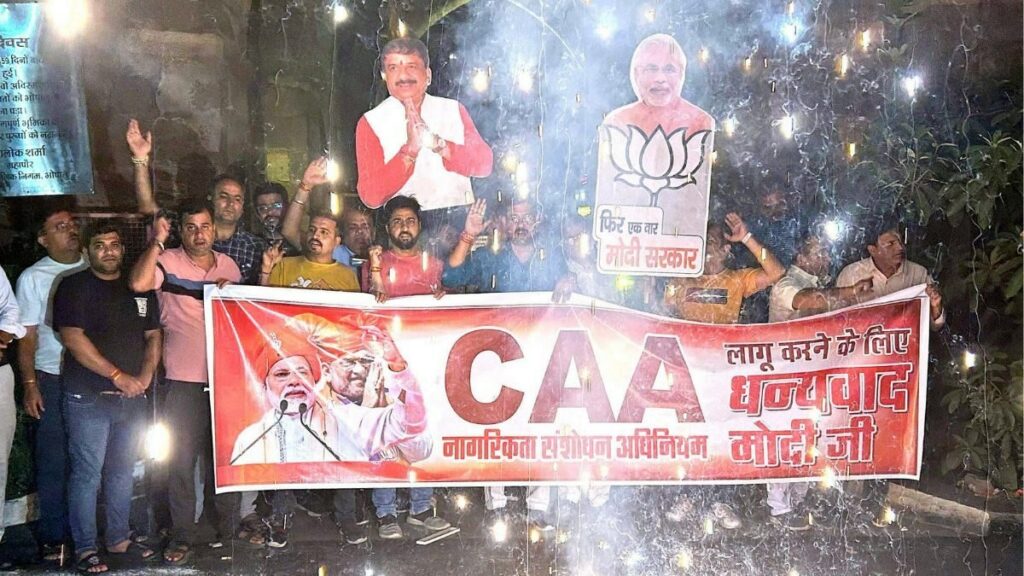The Citizenship Amendment Act, 2019 (CAA) does not impinge upon any existing right and does not affect the legal, democratic or secular rights of any Indian citizen, the Union government has said, dismissing any criticism about the act.
The CAA will provide citizenship to members of non-Muslim communities, such as Hindus, Sikhs, Jains, Parsis or Buddhists, from Pakistan, Afghanistan and Bangladesh.
“Many people of Indian origin including persons belonging to the said minority communities from the aforesaid countries have been applying for citizenship under section 5 of the Citizenship Act, 1955 but they are unable to produce proof of their Indian origin. Hence, they are forced to apply for citizenship by naturalisation under section 6 of the said Act, which, inter alia, prescribes twelve years’ residency as a qualification for naturalisation in terms of the Third Schedule to the Act. This denies them many opportunities and advantages that may accrue only to the citizens of India, even though they are likely to stay in India permanently. The CAA will help applicants belonging to the said communities from the aforesaid countries eligible for citizenship by naturalisation if they can establish their residency in India for five years instead of the existing eleven years,” government sources said.
Opposition parties like AIMIM have criticised the CAA for leaving out Muslims from its purview. “The act is unconstitutional, against our secular credentials. All persecuted minorities should be welcomed. Why leave out Muslims?” Waris Pathan, national spokesperson of AIMIM has said.
But the Centre clarified that the CAA does not classify or differentiate on the ground of religion instead it classifies on the ground of “religious persecution” in countries.
Countering opposition’s attempt to try to label CAA as an anti-Muslim law, government officials said rather than breaching any principle of “freedom of religion”, the CAA seeks to protect the “freedom of religion” of the classified communities who have been persecuted for exactly expressing and practising their respective religion in the particular neighbouring countries.
“The CAA does not impinge upon any existing right and does not affect the legal, democratic or secular rights of any Indian citizen. The existing regime for obtaining citizenship of India by foreigners of any country is untouched by the CAA and remains the same,” sources said.
Government sources explained that the CAA does not cancel the naturalisation laws, hence, any person, including Muslim migrants, from any foreign country seeking to be an Indian citizen, can apply for the same under the existing laws. “This Act does not prevent any Muslim, who is persecuted in those three Islamic countries, from practising their version of Islam from applying for the Indian citizenship under the existing laws.”
‘CAA the Need of the Hour’
Government sources said the constitutions of Pakistan, Afghanistan and Bangladesh provide for a specific state religion, which has led to persecution of many minorities such as Hindus, Sikhs, Buddhists, Jains, Parsis, and Christians.
“India and Pakistan had Nehru-Liaquat Pact, but since Pakistan did not honour its commitments, religious persecution of the minorities continued there. The human rights’ issue of these communities was raised in the UN by India but no concrete result emerged. CAA was the natural solution to solve the worries of persecuted religious minorities,” sources said.
Officials, however, conceded that the CAA is not meant to be an “omnibus solution to issues across the world and the Indian Parliament cannot be expected to take note of possible persecutions that may be taking place across various countries in the world”.
Officials said the classification of taking certain religions under CAA and exempting others is based upon “the Parliamentary recognition of the situation prevalent in the classified neighbouring countries, which is based on intelligible factors, constitutional provisions, numerous circumstances.”
‘CAA Answer to Deportation Worries’
Justifying the need for the CAA, government officials pointed out that in the previous provisions of the Citizenship Act, migrants from Hindu, Sikh, Buddhist, Jain, Parsi or Christian communities from Afghanistan, Pakistan and Bangladesh who entered India without valid travel documents or if the validity of their documents had expired were regarded as illegal migrants. This rendered them ineligible to apply for Indian citizenship under Section 5 or Section 6 of the Act. “Now, it is proposed to make the said migrants eligible for the Indian Citizenship. In this regard, the present act aims at granting immunity to the migrants of the aforesaid communities so that any proceedings against them in respect of their status of migration or citizenship does not bar them from applying for Indian citizenship,” officials said.
Apart from India’s belief in secular ethos and equality, there is freedom of religion for people professing different faiths. Also, there are 50 countries which have a state religion of Islam and 11 of them follow the Shariah laws, which is against the fundamentals of secularism, officials added.











